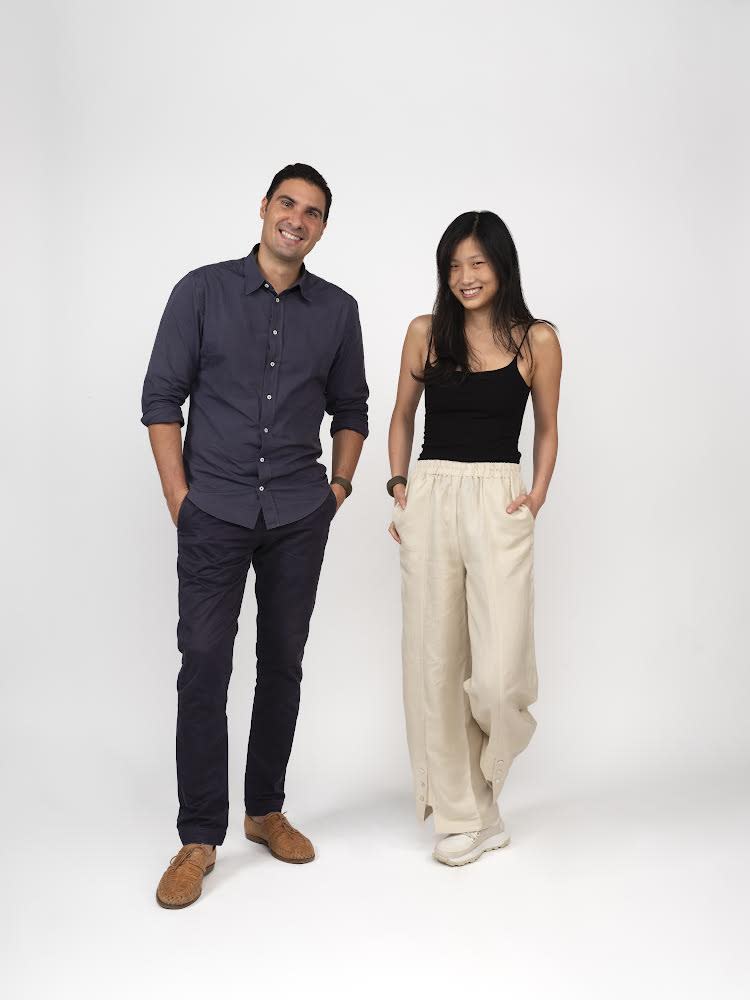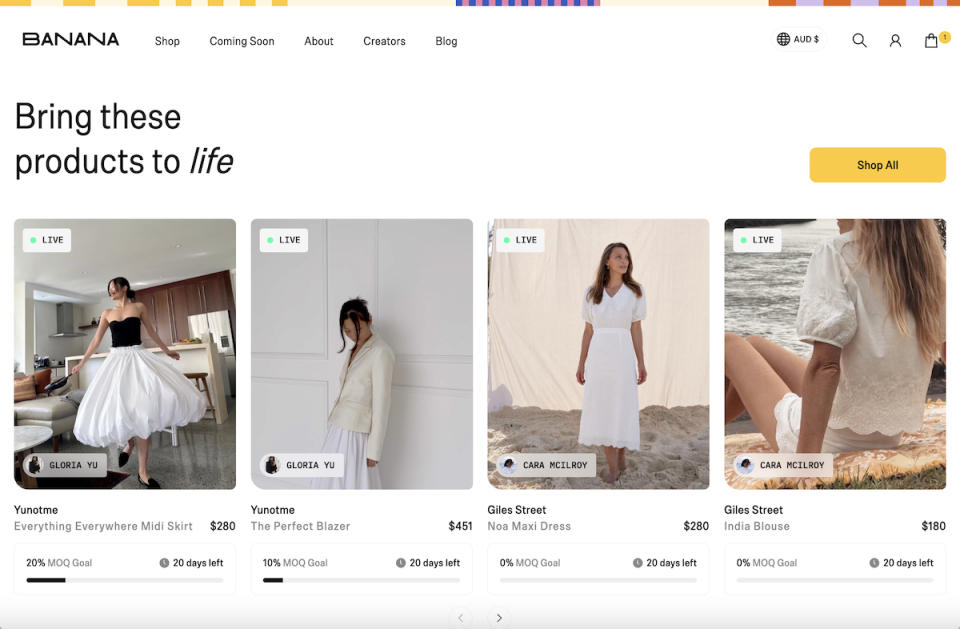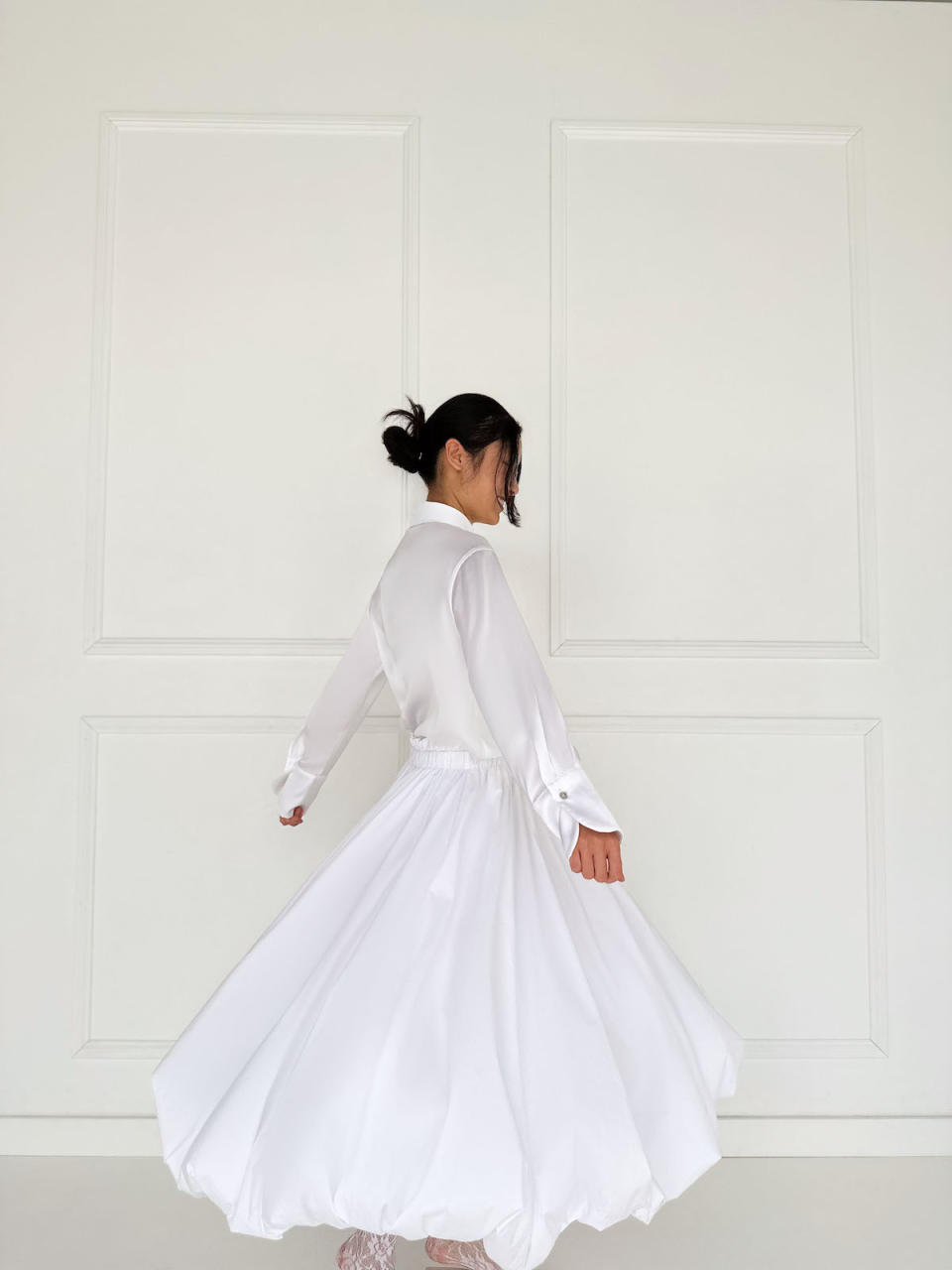Banana ‘Breaks Down Barriers’ By Connecting Creators With Suppliers

The 50 million strong global creators’ cohort is expected to touch a $480 billion global market by 2027, according to Goldman Sachs Research, following the boom of social commerce. Creators will continue to leverage their talents into small businesses, resulting in shifting power dynamics and the rise of the creator economy.
But these creators—including those interested in the fashion world—would traditionally have to invest anywhere from $500 to $50,000 to get their brands off the ground, according to software company ZMO.AI. Not to mention forge supply chain relationships, find manufacturing partners and solve what are often logistical nightmares to the creative-minded.
More from Sourcing Journal
Pattern-Making AI Startup Snatches $1.3 Million in Seed Round
Reformation's Inventory Optimization Partner Raises $17.5 Million
What if there was an easier way to streamline the transition from idea to execution?
Enter the world’s first dedicated fashion crowdfunding platform: Banana. The name, a nod to Andy Warhol’s Velvet Underground album artwork and Maurizio Cattelan’s Art Basel banana, symbolizes the transformation of something mundane—like fabric—into something fantastic—like fashion.
Luke Grana (chief executive officer) and Gloria Yu (chief product officer) founded the Australia-based creator-focused platform earlier this year in hopes of solving the excess inventory problem plaguing the industry.

“We saw a gap in the market where we could provide talented individuals with a solution that breaks down traditional barriers in fashion design,” Grana said. “Our platform empowers designers by providing a low risk, streamlined path from concept to market. It brings together creators with their visionary designs, specialty producers who share our commitment to quality and ethical manufacturing, and consumers who are eager to support and purchase unique, responsibly made fashion.”
Life partners Grana and Yu combined their individual skill sets—Grana has a background in scaling e-commerce business, having secured $20 million in funding from Alibaba for his namesake online-only fashion brand, Grana, while Yu is a self-proclaimed creative with a degree from Parsons in fashion design—to take their relationship to the next level: form a business partnership.
“We both intimately understand the challenges of launching and growing a brand and we feel like one of the key problems is inventory forecasting and management and, first of all, even just investing in inventory to kick-start your brand; that’s such a huge barrier of entry for so many individual creatives, even if they have great ideas,” Yu said. “Banana exists to try to lower the barrier of entry to launching and growing a fashion brand. And by that, we hope to foster a more diverse creative industry, and of course, reduce waste and avoid overproduction in the process.”
Banana wants to empower those curious about fashion creation to start their own brands by simplifying the process of designing, launching and operating an apparel company. To put it simply, Banana connects designers with suppliers.
“Lots of individual creators want to launch their own brands,” Grana said. “So let’s create a platform to make it really easy to launch those brands.”

In the first week, Banana garnered 130 preorders.
Here’s how it works: “creators” customize their storefront—effectively creating their brand. Then, those creators bring their concepts to life using Banana’s suite of design tools and services to also connect with the manufacturers who will produce the products. Once the idea is ready, creators work with the producer on a sample, which they can then take pictures of and launch for customers to preorder.
Creators are then tasked with marketing their preorder campaigns before and during the launch. When the order quantity for the product hits the minimum number needed to make production viable—also called an MOQ—the collection is produced and shipped to the customer within three weeks. MOQs on the site go as low as 30 pieces.
“A key part of our platform was obviously our product crowdfunding tools. Creators will work with their manufacturer and setting a minimum order quantity goal, and then get their audience and our customers to help them fund towards this goal,” Grana said. “I think No. 1, it avoids overproduction, and also it just gives good data to the to the creator and the brand before they even place an order. You know, 150 billion garments are produced annually, and then like 30 percent of that isn’t even sold. We really hope that this product will be a great tool for brands and individual creators to reduce waste.”
Currently, Banana works with four producer partners, with plans to grow that number in the future. Those partners include Leverstyle, Knitup, Houzhou Worldbest and Fashion Enter.
Hong Kong-based Leverstyle produces products for e-commerce brands like Stitch Fix and Boden, as well as designer labels like Rag and Bone and Theory. The registered B Corp. specializes in athleisurewear, technical sportswear and performance outerwear—and was one of the first manufacturers in China to become SA8000 certified.
Known for fast and ethical knitwear, Knitup takes a tech-driven approach to design. Houzhou Worldbest is one of Grana’s favorite manufacturers as he’s worked extensively with them throughout the years through ventures with Gana. The China-based supplier specializes in silk and knitwear.
Established in 2010, Fashion Enter’s London facility produces an average of 15,000 garments a week for various global fashion companies as the only UK company with “leading status” in the ethical and technical Fast Forward audit. Fashion Enter specializes in womenswear and soft separates in jersey for designers based in the UK and Europe.
“We’re essentially connecting the creative directly with the producer. But what’s happened with the producers is their skill level has really increased, so now they’ve got their own template blocks,” Grana said. They’ve got access to all their own fabrics, their pattern grading in-house, and all the other technical knowledge in-house. So if you add a creator—who has a great design idea and a great product and marketing skills—with a really skilled producer, you can create a great product.”
As far as creator brands go, Banana currently has four, with one more in the works.
“At the beginning, it was really a lot of cold emails, lots of intros to people and lots of friends of friends,” Yu said of forging those creator connections. “But now that we’ve launched, people can kind of see what it is and it will be easier for us to onboard new creators.”
Yu’s brand, Yunotme, has two products on the platform: the Everything Everywhere Midi Skirt, which has reached its MOQ goal, and the Perfect Blazer, made with wool, Tencel and cotton.

“We thought it was important for Yunotme to relaunch on Banana because not only is Banana solving problems for me as a fashion brand owner—I am the target creator audience—it is also important for me leading product to intimately understand the user experience from a creative entrepreneur’s perspective,” Yu said of her brand, which first began as a luxury headpiece brand while she was in New York. “Along with gaining user feedback from our creators and brands, being a genuine user of the platform myself is super helpful in informing the design of Banana and how it could support fashion entrepreneurs in sustainably and successfully running their businesses, and enabling them to spend more time doing what got them started in the first place—creating.”
Giles Street was founded by Cara Mcilroy, an Australian model and judge on “Asia’s Next Top Model” as well as a longtime friend of Grana and Yu, and is one of the first brands to launch on Banana with six pieces. Her India Blouse, made of 100 percent cotton, featuring embroidered details and an Edwardian-style collar, is the first piece to reach 100 percent of its MOQ goal.
“We always knew Cara wanted to create her own brand, but we know that there’s barriers to entry, obviously—setting up a website, investing in inventory, having warehousing for suppliers—so we always talked about those difficulties over the past five years,” Grana said. “And when we came to her with the Banana concept of making it really easy, it was just a no-brainer for her.”
Inspired by Ivy League style, Artisthood by Andy Dass hails from Montreal and “aims to create contemporary designs with artful flourishes,” the artist said. SOL by Lois Tien is a collection of loungewear that debuted with six pieces made from linen and Tencel.
Matehba by Sarah Prisca will be launching on the platform soon.
The disruptor recently raised roughly $335,000 in pre-seed funding from angel investors. That money will be used to help secure key team members and scale the number of creators on the platform. The startup said it’s preparing for a larger seed funding round in the new year, which will be crucial for Banana to onboard more creators, producers and customers.
“At Banana, we’re creating a world where anyone, regardless of their background or resources, has the opportunity to bring their fashion ideas to life,” Yu said. “This is about more than clothes; it’s about empowering individuals to express their creativity and make their mark in fashion.”

